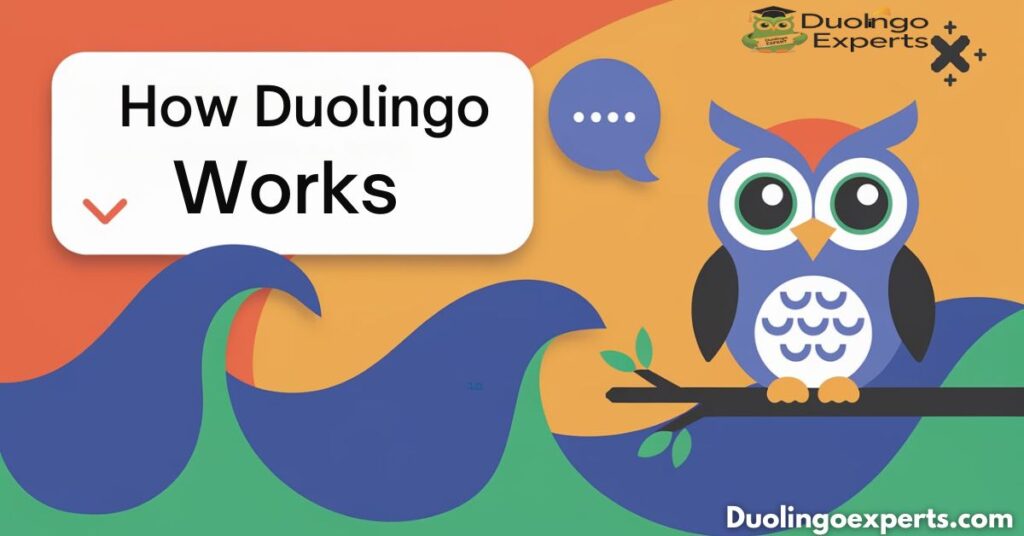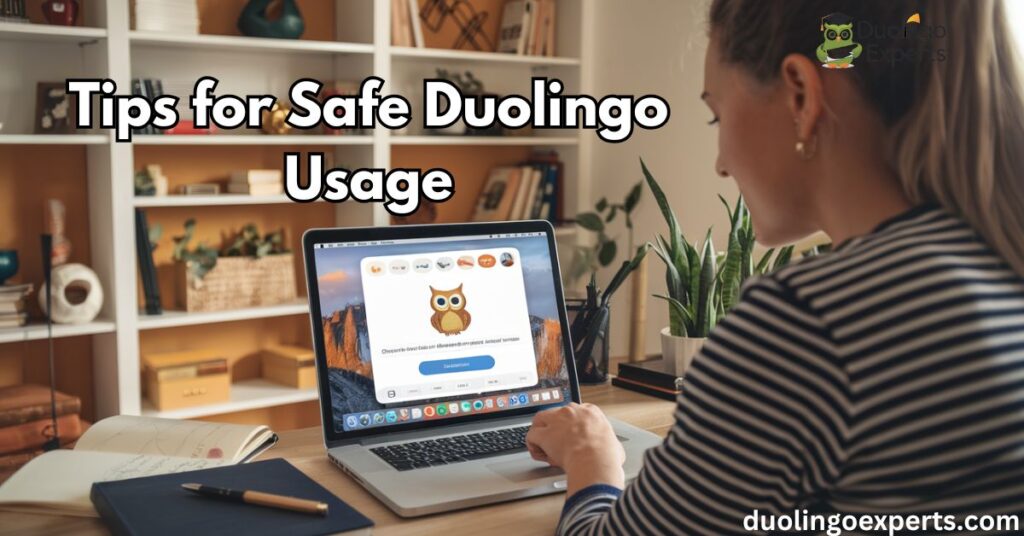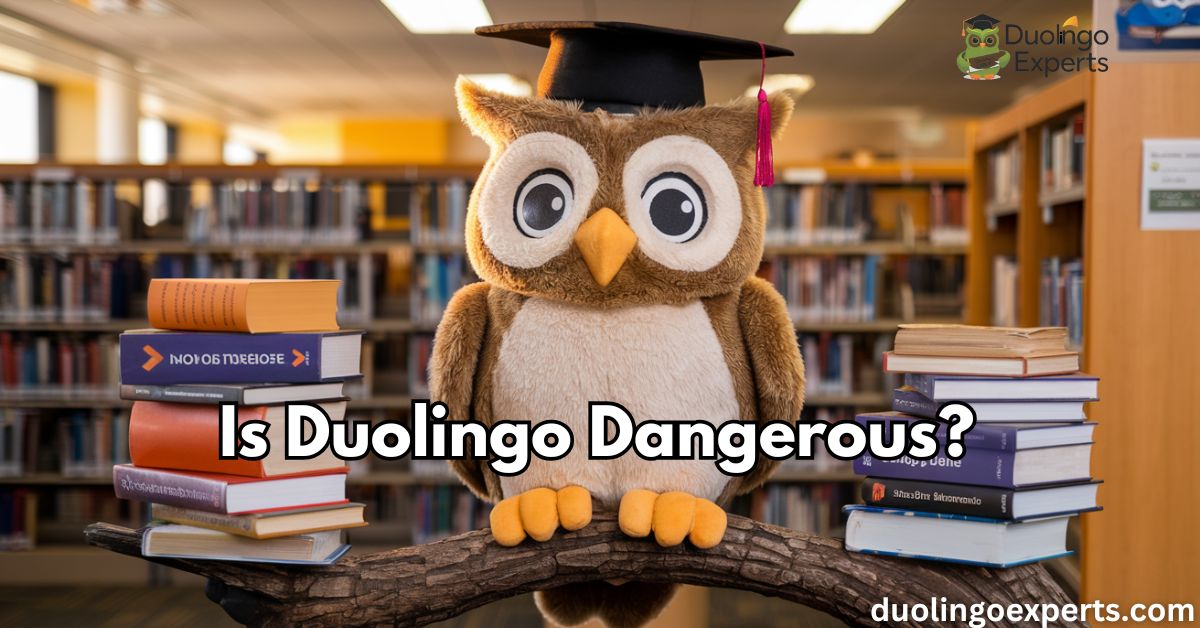Language learning apps have become a staple in many people’s daily routines, and Duolingo is one of the most popular platforms out there. With its engaging and user-friendly design, Duolingo has made learning a new language easier and more accessible than ever before. But, as with any app that collects data and engages users in gamified ways, some have raised concerns about its safety, privacy issues, and potential addictive behaviors. Is Duolingo dangerous? These concerns highlight the need for users to stay informed and take precautions.
Is Duolingo really safe to use? Or does it come with hidden risks that users should be aware of? This detailed guide will explore these questions and provide a thorough analysis of Duolingo’s privacy policy, security protocols, and potential risks. Whether you’re a beginner trying to pick up a new language or a parent wondering if the app is safe for kids, this guide will offer clear insights.
What is Duolingo?
Duolingo is a popular language-learning app that boasts an impressive number of active users. Launched in 2011, it has grown rapidly, now offering lessons in over 40 languages, from commonly spoken ones like Spanish and French to more niche languages like Swahili and even fictional ones like Klingon. What sets Duolingo apart is its gamified approach to learning—turning language acquisition into an interactive game that rewards users with XP points, badges, and new levels.
The Duolingo Learning Experience
Duolingo is designed to be engaging, even for the most casual learner. The app employs a mix of multiple-choice questions, fill-in-the-blank exercises, speaking practice, and listening comprehension to teach new words, phrases, and grammar. Its main selling point is the bite-sized lessons that are easy to complete in a few minutes, making it convenient for busy users.
The app also uses an innovative progress tracking system, where users earn points for each completed lesson, and their progress is visually tracked through a skill tree. This visual representation of your learning progress is a powerful motivator, and the “gameification” keeps users engaged long-term.
However, the app’s approach to learning has its share of concerns, particularly in the areas of privacy, security, and addictive behavior.
Duolingo’s Popularity and User Base
Duolingo has become a major force in the world of language learning apps. As of 2023, it has over 500 million users worldwide—a testament to the app’s broad appeal. The platform is especially popular among self-learners, people who enjoy learning at their own pace without the constraints of a formal classroom setting.
Its free version has been a major factor in its success. Unlike many other language learning platforms that require paid subscriptions, Duolingo offers a comprehensive set of features for free, making it accessible to people worldwide. The company’s business model is supported by advertising on the free version and the paid version, which eliminates ads and provides additional features like offline access to lessons and unlimited hearts (which prevent users from taking more lessons if they make too many mistakes).
Despite its massive user base, Duolingo has come under fire for privacy concerns, particularly when it comes to how it collects and uses user data.
How Duolingo Works

At its core, Duolingo is designed to provide an intuitive, engaging, and fun way to learn languages. But how exactly does it work? Let’s break it down:
Gamification in Language Learning
Duolingo uses elements of gamification—incorporating points, badges, and levels—to keep learners motivated. The app’s unique structure encourages users to complete lessons every day in order to maintain daily streaks. Streaks are a major driving force in Duolingo’s engagement model, pushing users to keep learning even when they don’t feel like it.
For each lesson completed, users earn XP (experience points), and completing certain milestones unlocks badges and new levels. The app’s reward system fosters competition and social sharing as users compare their progress with friends or other learners on the platform. This can create a sense of achievement and increase user retention.
Lesson Structure and Progress Tracking
Duolingo’s lessons are designed to be short, typically taking no more than 5 to 10 minutes to complete. They are structured as follows:
- Multiple-choice questions: Users choose the correct translation or word in a sentence.
- Fill-in-the-blank exercises: These ask users to complete sentences by typing in the correct word or phrase.
- Speaking exercises: Duolingo prompts users to speak certain phrases, helping with pronunciation.
- Listening comprehension: These exercises test the user’s ability to understand spoken language.
The app tracks your progress through a visual skill tree. This helps learners visualize how far they’ve come in their language learning journey. As users progress, they unlock new skills and more advanced lessons.
Progress Tracking & Motivation
One of the most significant features of Duolingo is its progress tracking system. Users can track their daily XP points, review skills they’ve mastered, and see the overall progress they’ve made in the language. The app rewards consistency, motivating users to complete lessons every day.
Potential Dangers of Using Duolingo
While Duolingo is generally safe to use, there are several potential risks and safety concerns that users should be aware of. These include data collection practices, privacy concerns, and the addictive nature of the app’s gamified design. Let’s dive into these issues.
Data Collection Practices
Like many other free apps, Duolingo collects data from its users. This includes:
- Personal data: such as email addresses, names, and device information.
- Usage data: such as how long you spend in the app, which lessons you complete, and how often you log in.
- Performance data: which helps Duolingo personalize your learning experience and improve the app.
All of this data is used to provide a personalized learning experience and improve the platform. However, some of this data is also shared with third-party advertisers. This raises privacy concerns about the extent to which personal data is being collected and how it is being used.
Privacy Concerns
Duolingo’s privacy policy has been a subject of concern for many users. The app collects a large amount of data, which could be vulnerable in the case of a data breach. Even though Duolingo uses encryption to protect user data, there is always the possibility that personal information could be exposed in the event of a security breach.
Another concern is the sharing of personal data with third-party advertisers. While Duolingo anonymizes some of the collected data, it still allows advertisers to target specific groups of users based on their activities within the app. This raises questions about how transparent Duolingo is with its data-sharing practices.
Duolingo’s Security Measures

Duolingo has taken steps to address security concerns and protect its users’ data. The platform employs several security measures to keep your data safe:
- Encryption: All data is encrypted both in transit and at rest. This means that your personal information is protected from hackers while it is being transferred and while it is stored in Duolingo’s servers.
- Two-factor Authentication (2FA): Duolingo offers two-factor authentication to enhance user account security. With 2FA enabled, users must verify their identity using a second factor, such as a code sent to their phone, in addition to their password.
- API Protections: Duolingo has implemented measures to protect its APIs, which can sometimes be vulnerable to attack. This helps ensure that only authorized users can access and modify account data.
Despite these protections, Duolingo is not completely immune to security risks. Users should always be vigilant and take steps to enhance their own account security.
Past Security Incidents Involving Duolingo
Duolingo has faced a number of security incidents over the years. One of the most notable was the 2023 data scraping incident. In this case, hackers were able to scrape large amounts of data from Duolingo’s public API, exposing user data such as usernames, email addresses, and activity logs.
While Duolingo claimed that no sensitive data (such as passwords) was compromised, the incident highlights the ongoing risks of using an online platform that collects personal information.
Lessons Learned and Improvements Made
Following this incident, Duolingo took significant steps to improve its security. These included:
- Strengthening API protections to prevent unauthorized access.
- Revising its privacy policy to ensure that users are fully informed about the data that is collected and how it is used.
- Conducting a security audit to identify vulnerabilities and improve overall system resilience.
These improvements are a positive step forward, but users must still take steps to protect their personal information, especially when using the free version of the app.
Comparing Duolingo’s Safety to Other Language Learning Apps
When it comes to privacy and security, how does Duolingo compare to other popular language learning apps? Let’s take a look.
| Feature | Duolingo | Babbel | Rosetta Stone | Memrise |
|---|---|---|---|---|
| Free Version | Yes | No | Yes (limited) | Yes |
| Ad-Free Option | Yes (premium version) | Yes (premium version) | Yes (premium version) | Yes (premium version) |
| Data Collection | Extensive | Moderate | Minimal | Moderate |
| Privacy Controls | Basic | Advanced | Advanced | Advanced |
| Two-Factor Authentication | Yes | Yes | Yes | Yes |
Duolingo vs. Competitors: A Quick Comparison
- Duolingo: Offers a free version with ads and a paid version with fewer ads and additional features. The data collection is extensive, and privacy settings are fairly basic. However, Duolingo’s security measures, such as encryption and two-factor authentication, help safeguard users’ information.
- Babbel: This app offers a more premium experience, with a subscription required for full access. Babbel has better privacy controls and advanced security measures compared to Duolingo.
- Rosetta Stone: Known for its minimal data collection, Rosetta Stone provides a more traditional, premium language-learning experience with fewer ads and stronger privacy protections.
- Memrise: Similar to Duolingo, Memrise offers both free and premium versions, but it’s considered to have moderate privacy controls and data collection practices.
Tips for Safe Duolingo Usage

If you’re using Duolingo and want to ensure your safety, here are some steps you can take:
- Enable Two-Factor Authentication: This adds an extra layer of security to your account.
- Use a Strong Password: Ensure your password is unique and difficult to guess.
- Review Privacy Settings: Adjust your privacy settings to limit the data you share with Duolingo.
- Monitor Screen Time: If you’re worried about becoming too addicted to the app, set limits on your daily usage to ensure a healthy balance.
- Manage App Permissions: Regularly check what permissions Duolingo has on your device and turn off any unnecessary ones.
By being mindful of these precautions, you can enjoy the many benefits of Duolingo while minimizing risks.
Frequently Asked Questions
What are the risks of Duolingo?
The risks of Duolingo include privacy concerns related to data collection and potential addictive behavior due to its gamified design. Users may also face security issues if they don’t take proper precautions, such as enabling two-factor authentication.
Am I safe from Duolingo?
Duolingo is generally safe to use, but there are privacy concerns related to data collection and sharing with third-party advertisers. To stay safe, ensure you enable two-factor authentication, review privacy settings, and manage app permissions.
Why are people leaving Duolingo?
People are leaving Duolingo due to concerns about its privacy practices and excessive data collection. Additionally, some users find its gamified design addictive or prefer more traditional language-learning methods.
Is the Duolingo bird safe?
The Duolingo bird, known as Duo, is a friendly mascot and poses no safety risks. However, concerns about data privacy and security apply to the app itself, not the bird.
What are the disadvantages of Duolingo?
The disadvantages of Duolingo include privacy concerns due to data collection and sharing with third-party advertisers. Additionally, its gamified design can lead to addictive behavior and excessive screen time.
Is Duolingo losing users?
Yes, Duolingo has seen some users leave due to concerns about privacy issues and its addictive gamification. Some users also prefer more traditional language-learning methods or apps with stronger privacy protections.
Who is the CEO of Duolingo?
The CEO of Duolingo is Luis von Ahn, who co-founded the company in 2011. He is a prominent entrepreneur and a professor at Carnegie Mellon University.
How trusted is Duolingo?
Duolingo is generally trusted for its language-learning effectiveness and has a large user base. However, concerns about privacy and data security remain, especially regarding data collection and third-party sharing.
Conclusion: Is Duolingo Dangerous?
So, is Duolingo dangerous? Not inherently. The app offers an engaging and effective language learning experience, but like any online platform, it comes with privacy concerns and security risks. By taking the necessary precautions—such as enabling two-factor authentication, reviewing privacy settings, and being mindful of app permissions—you can safely use Duolingo to learn a new language without compromising your personal information.
While Duolingo has its flaws, it remains one of the most accessible and effective tools for language learning available today. Whether you choose to use the free version or upgrade to a premium account, Duolingo provides a flexible and enjoyable way to build your language skills—just make sure to stay informed and take steps to protect your privacy.
>>>Read Also: What Type Of Spanish Does? Discover the Truth Here!

DuolingoExperts, managed by MarkJohan, offers expert insights and tips for mastering languages. A tech-driven platform to enhance your learning experience.

